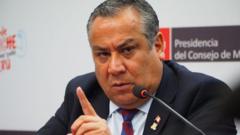Peru's Prime Minister Gustavo Adrianzén resigned hours before a scheduled no-confidence vote in Congress, following the shocking kidnapping and murder of 13 mine workers. This resignation marks a significant setback for President Dina Boluarte, already facing declining approval ratings due to rising crime rates. The resignation triggers a cabinet reshuffle, compelling the president to replace her entire cabinet despite recent appointments. The political climate in Peru is increasingly strained, with public discontent over crime and safety leading to widespread protests, further challenging Boluarte's administration.
Peru's Prime Minister Steps Down Amidst Political Turmoil

Peru's Prime Minister Steps Down Amidst Political Turmoil
Gustavo Adrianzén resigns just before a no-confidence vote, heightening uncertainty in Peruvian governance.
Peru's political landscape encountered further upheaval as Prime Minister Gustavo Adrianzén tendered his resignation mere hours before he was set to face a no-confidence vote in Congress. The vote was prompted by the national outrage following the horrific kidnapping and murder of 13 mine workers, an incident that has reverberated throughout the country, igniting fears and anger among the populace.
This sudden resignation represents yet another obstacle for President Dina Boluarte, whose governance has already been plagued by significantly low approval ratings as crime continues to escalate. The political fallout from Adrianzén's departure will require Boluarte to appoint a new prime minister, which consequently leads to an entire cabinet overhaul. According to Peru’s constitution, the resignation of a prime minister mandates that all ministers must also resign. While Boluarte retains the option to reappoint her former ministers once a new prime minister is installed, the immediacy of the situation compounds the challenges her administration faces.
Just prior to his resignation, Adrianzén had been confirmed as prime minister, a position he had held for a brief period as the third individual in that role under Boluarte. It is indicative of the turmoil surrounding her presidency that, shortly before the prime minister’s unexpected exit, Boluarte had reshuffled her cabinet, appointing new ministers for finance, interior, and transport. Those freshly appointed ministers are also now faced with departure hours into their new terms.
Public sentiment has additionally taken a downturn, with Boluarte's administration grappling with rising crime rates, leading to citizens expressing their dissatisfaction vocally. Recent protests have seen hundreds of Peruvians taking to the streets in demand for immediate action against extortion and the killings stirred by criminal gangs. Demonstrators have rallied under banners demanding "no more deaths," underscoring the urgent call for solutions to enhance security and restore public safety.
As the nation navigates these turbulent waters, the immediate steps taken by President Boluarte will be critical in shaping Peru's political and social landscape in the months to come.



















